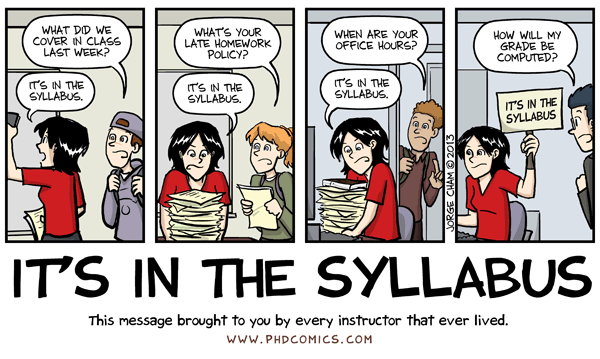Princeton Prof Makes Awesome Intro Syllabus

Creating a class syllabus is sort of a work of academic art. Some may fancy David Foster Wallace's course handouts, but Professor Gayle Salamon, who teaches Intro to Gender Studies and a course in Queer Theory, has her own flair for explaining to newcomers the expectations on her assigned essays. An excerpt:
Questions that Professor S is Frequently Asked About Papers. With Answer Key.
Q: Professor S, when is the paper due?A: It is due right before class starts.
Q: Can I email it to you?A: Nope. I would like it printed on paper, stapled, sitting in a neat stack on my desk before class starts. (Elsewhere, she writes: "I am not kidding about that staple." Having taken her class, she is truly not.)
Q: Can I talk to you about my paper?A: Absolutely yes. Come to my office hour and we'll chat.
Q: Can I send you a paragraph of my paper to read?A: Absolutely.
Q: How about a whole page?A: Sure.
Q: How about the whole paper so you can tell me if I'm on the right track?A: No. But if you want to tell me what your argument is, I can give you feedback.
Q: But can't I check in with you about an idea I came up with while drinking a Red Bull at 4 in the morning after working on my paper all night long the night before it is due?A: I so don't want to read that email...If you wait until the very last minute, you're on your own pal.
Q: Should I turn in my first draft?A: Sometimes you will. But I can guarantee you that your second draft will be better.
Q: Margins? Font size? How do you feel about Courier?A: Double spaced, 12 pt font, one-inch margins. Courier is like a big Post-It note on the front page of your paper telling me that your paper is not long enough.
The whole thing (viewable here) is pretty great, including some rather helpful tips like:
- "Being quarrelsome and critical are not the same thing as advancing an excellent argument. Remember: before you say No to a text you need to first say Yes to it three times. You must:1) Read it. In its entirety. More than once.2) Be able to reproduce the argument and3) Attempt to extend the argument somewhere the author did not."
- "Don't start your paper with a huge broad claim: 'From the beginning of time...'"
- "When your paper is written, don't wait to print it out three minutes before class. Printers can sense your fear and will jam or run out of ink and you will be late and I will be unhappy."
I can definitely confirm the last one is true.
